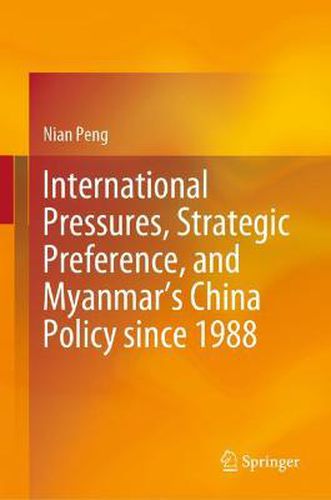Readings Newsletter
Become a Readings Member to make your shopping experience even easier.
Sign in or sign up for free!
You’re not far away from qualifying for FREE standard shipping within Australia
You’ve qualified for FREE standard shipping within Australia
The cart is loading…






This title is printed to order. This book may have been self-published. If so, we cannot guarantee the quality of the content. In the main most books will have gone through the editing process however some may not. We therefore suggest that you be aware of this before ordering this book. If in doubt check either the author or publisher’s details as we are unable to accept any returns unless they are faulty. Please contact us if you have any questions.
This book mainly explored the driving forces and evolvement of Myanmar’s China policy since 1988 by adopting a neo-classical realist apporach, an emerging theoretical paradigm aiming at analyzing state’s foreign behaviour by connecting systemic and unit variables which refers to external environments and domestic restraints respectively. It is the first book that seeks to give a theoretical explanation of Myanmar’s diplomacy, thereby bridging the gap from basic research to the deep one with theories. It also introduced the concept of strategic preference and argued that the competing strategic preference that the Burmese leaders have, namely integration and isolation , determines Myanmar’s responses to China in the Post-Cold War era, which not only demonstrates the neo-classical realism as an useful instrument of looking into state’s foreign policy and deepens the understanding on Myanmar-China relations.The main content of this book is divided into seven parts, in which the first chapter introduces the background, the present study on Myanmar’s China policy and China’s Myanmar policy, the analytical framework, and the arrangement of the content. Chapter 2 focuses on the roots and changes of Myanmar’s competing strategic preference as well as its influences on Myanmar’s foreign policy. The following four chapters examine the international pressures and benefits imposed by systemic imperatives, and Burmese leaders’ specific strategic preference since 1988, and investigate Myanmar’s policy towards China in different periods. Finally, it provides a comprehensive conclusion that outlines and reviews the origins and evolution of Myanmar’s China policy, and predicts its future directions.This book is suitable for the graduates and experts who are interested in international relations, the Asian studies and neo-classical realism in particular, and Myanmar politics and foreign relations, as well as China’s relation with neighboring countries.
$9.00 standard shipping within Australia
FREE standard shipping within Australia for orders over $100.00
Express & International shipping calculated at checkout
This title is printed to order. This book may have been self-published. If so, we cannot guarantee the quality of the content. In the main most books will have gone through the editing process however some may not. We therefore suggest that you be aware of this before ordering this book. If in doubt check either the author or publisher’s details as we are unable to accept any returns unless they are faulty. Please contact us if you have any questions.
This book mainly explored the driving forces and evolvement of Myanmar’s China policy since 1988 by adopting a neo-classical realist apporach, an emerging theoretical paradigm aiming at analyzing state’s foreign behaviour by connecting systemic and unit variables which refers to external environments and domestic restraints respectively. It is the first book that seeks to give a theoretical explanation of Myanmar’s diplomacy, thereby bridging the gap from basic research to the deep one with theories. It also introduced the concept of strategic preference and argued that the competing strategic preference that the Burmese leaders have, namely integration and isolation , determines Myanmar’s responses to China in the Post-Cold War era, which not only demonstrates the neo-classical realism as an useful instrument of looking into state’s foreign policy and deepens the understanding on Myanmar-China relations.The main content of this book is divided into seven parts, in which the first chapter introduces the background, the present study on Myanmar’s China policy and China’s Myanmar policy, the analytical framework, and the arrangement of the content. Chapter 2 focuses on the roots and changes of Myanmar’s competing strategic preference as well as its influences on Myanmar’s foreign policy. The following four chapters examine the international pressures and benefits imposed by systemic imperatives, and Burmese leaders’ specific strategic preference since 1988, and investigate Myanmar’s policy towards China in different periods. Finally, it provides a comprehensive conclusion that outlines and reviews the origins and evolution of Myanmar’s China policy, and predicts its future directions.This book is suitable for the graduates and experts who are interested in international relations, the Asian studies and neo-classical realism in particular, and Myanmar politics and foreign relations, as well as China’s relation with neighboring countries.